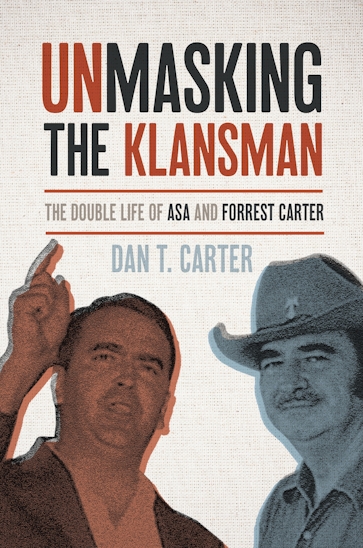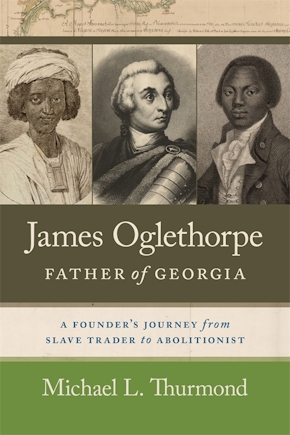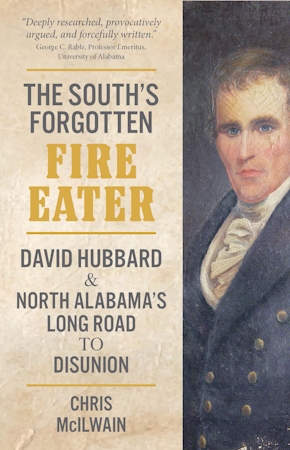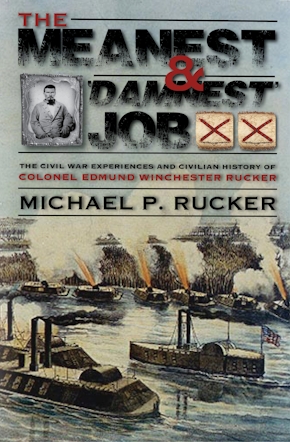Unmasking the Klansman may read like a work of fiction but is actually a biography of Asa Carter, one of the South's most notorious white supremacists (and secret Klansman). During the 1950s, the North Alabama political firebrand became known across the region for his right-wing radio broadcasts and leadership in the white Citizens' Council movement. Combining racism and thinly-concealed anti-Semitism, he created a secret Klan strike force that engaged in a series of brutal assaults, including an attack on jazz singer Nat King Cole as well as militant civil rights activists. Exploring his life during these years offers new insights into the legal maneuvers as well as the violence used by white Southern segregationists to derail the civil rights movement in the region.
In the early 1960s Carter became a secret adviser to George Wallace and wrote the Alabama governor's infamous 1963 inauguration speech vowing "segregation now, segregation tomorrow, segregation forever." When Carter disappeared from Alabama in 1972, few knew that he had assumed a new identity in Abilene, Texas, masquerading as a Cherokee American novelist. Using the name “Forrest" Carter, he published three successful Western novels, including The Rebel Outlaw: Josey Wales, which Clint Eastwood made into a widely acclaimed 1976 movie. His last book, The Education of Little Tree (a fake biography of his supposed Indian childhood) posthumously became a number one best-seller in 1991.
Author Dan T. Carter uncovered “Forrest" Carter's true identity while researching his biography of Georgia Wallace and in a New York Times' op-ed he exposed Carter's deception. Although the difficulties of uncovering the full story of the secretive Carter initially led him to abandon the project, in 2018 he gained access to more than two hundred interviews by the late Anniston newsman, Fred Burger. These recordings and his two decades of exhaustive research finally brought Asa Carter's story into focus. Unmasking the Klansman is the result.
More than a biography, this book takes readers on a journey of moral reflection on U.S. history that puts in full views white supremacy’s persisting rationale of racist theology, Christian nationalism, and hateful right-wing politics.
—Thomas J. Davis, Library Journal (starred review)
Only Dan T. Carter could have unearthed a story so surreal, so essential to our understanding of modern American politics and culture. This book is a triumph.
—Elaina Plott, staff writer, The Atlantic
Unmasking the Klansman is . . . a deep dive into the slow but steady progress of far-right Christian-nationalist thought creeping from the dark corners of our country into acceptability on the edges of mainstream political discourse.
—Paul Stekler, Texas Observer
Dan T. Carter has long stood as one of the most insightful scholars of the modern South. In this beautifully written new book, he turns his talents to his most fascinating subject yet: a man who first made a name for himself as a vocal champion of white supremacy and then, amazingly, reinvented himself as a celebrated literary author and fake Native American.
Unmasking the Klansman is a masterful tale well told.
—Kevin M. Kruse, history professor, Princeton University
In this gripping portrait of the perversely fascinating conman Asa Carter, the distinguished historian Dan T. Carter takes us on a journey deep into America's heart of darkness. His subject was a self-appointed defender of aggressive white supremacism in the past but also a harbinger of defensive white supremacism in the present. Written with great insight and conviction, this is both first rate history and an implicit study of the moral landscape in which we still live. Dan T. Carter has made another superb contribution to America's ongoing effort to understand itself.
—Andrew Delbanco, Alexander Hamilton Professor of American Studies, Columbia University
Unmasking the Klansman stands as a brilliant piece of detective work and historical storytelling by one of the masters of the craft. . . . Dan T. Carter has given us not only a life-is-stranger-than-fiction tale from the dark underbelly of racial politics;
Unmasking the Klansman also offers a grim perspective on our own time. A superb and unexpected biography from one of America's most gifted historians.
—Frye Gaillard, coauthor of The Southernization of America: A Story of Democracy in the Balance
As might be expected from the brilliant chronicler of the Scottsboro case and biographer of George Wallace, Dan T. Carter has written a compelling and dramatic expose of a conman, violent Klansman, Wallace speechwriter, western novelist, and fictional memoirist. But Carter has written more than a fascinating detective story. He shows us how the violent extremism of the white Christian right has dangerously entered the political mainstream of Donald Trump's America.
—Tony Badger, emeritus Paul Mellon Professor of American History, Cambridge University
If you would have told me that the guy who ghost-wrote one of the most famous endorsements of segregation was the same guy who wrote the book that led to a classic Hollywood western, I wouldn't have believed you. But now comes historian Dan T. Carter's gobsmacking new book,
Unmasking the Klansman. The ever-curious professor Carter took nuggets of information squirrelled away over the years and turned them into this rousing and often frightening life story. . . . Carter's scholarship leads to the inexorable conclusion that yesterday's hate and rage are a foundation for the dysfunction in today's politics.
—Andy Brack, editor and publisher, Charleston City Paper
Unmasking the Klansman is a scrupulous and compelling account of a wild man with a talent for fomenting racist opposition to the elite power structure: first as a local agitator, second as a line-crafter for a national figure, and third—in a bizarre but in the biographer’s hands totally believable twist—as a popular novelist who swapped out his birth name and actual life for a fictional back story as a Cherokee Indian with a first name that paid tacit tribute to Nathan Bedford Forrest, the Confederate Army general who became the first Grand Wizard of the Ku Klux Klan.
—Michael Cornfield, Pro Rhetoric
...Dan Carter has done it again. He has unraveled a stranger-than-fiction story about a skillful but dangerous man who was deeply enmeshed in some of the ugliest aspects of American life in the mid-twentieth century and who later succeeded in selling himself as a New-Age-type prophet when he was just a sophisticated charlatan.
Unmasking the Klansman is a real page-turner that should give all of us pause.
—Jonathan L. Entin, The Alabama Review



